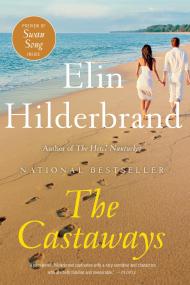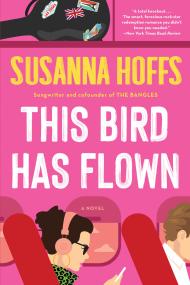We have updated our Privacy Policy Please take a moment to review it. By continuing to use this site, you agree to the terms of our updated Privacy Policy.
Things I Wish I Told My Mother
The Perfect Mother-Daughter Book Club Read
Description
An artist and her perfectionist mother unpack a lifetime of secrets while on vacation in Paris in this moving novel—perfect for fans of One Italian Summer.
A mother and daughter on vacation in Paris unpack a lifetime of secrets and hopes—with a giant Pattersonian twist at the end!
Every daughter has her own distinctive voice, her inimitable style, and her secrets.
Laurie is an artist, a collector of experiences. She travels the world with a worn beige duffel bag.
Every mother has her own distinctive voice, her inimitable style, and her secrets.
“Dr. Liz,” Laurie’s mother, is an elegant perfectionist who travels the world with a matched set of suitcases.
When Laurie surprises her mother with a dream vacation, it brings an unexpected sparkle to her eyes. So begins Things I Wish I Told My Mother. You will wish this novel never ends.
Praise
What's Inside
CHAPTER 1
RIGHT NOW, I AM standing thirty feet away from seventy million dollars.
Well, sort of.
Thirty feet from me, the key movers and shakers from Boujee Cosmetics are gathering in the mahogany-paneled conference room of my advertising agency, Vanessa. Several of them wave to me as they pass by—the president, the CEO, the director of marketing. This is not the first time they’ve been here.
And we’re hoping it won’t be the last.
Several months ago, the seventy-million-dollar Boujee account parted ways with its advertising agency. Suddenly ad agencies all over the city popped up like Whac-a-Moles, vying for the account. Most were eliminated in the first round (agency credentials and case histories) or the second (strategic development and media).
So now it’s down to us and an agency in Dumbo, the cooler-than-cool section of Brooklyn. Today’s the day we get to dazzle our clients-to-be with creative ideas on how to get all those Gen X, Y, and Zers to ditch their old shampoos, conditioners, volumizers, texturizers, lipsticks, moisturizers, foundations—and switch to Boujee instead.
That’s where I come in.
You’ve probably seen all those rom-coms where a cute, pert, perky young woman (always petite and blond) lands the account by charming the CEO (always a man).
Well, that’s not me.
At five foot ten, with shoulder-length brown hair and blue eyes, I can bench press half my weight. Well, half my ideal weight. Since my college swimming days—and my divorce—I’m at least ten pounds away from ideal. The curse of the ex-athlete a few years from turning forty.
Anyway, pert and perky is not how the game is played anymore.
These days, you have to learn a whole new Rosetta Stone–like language about “brand hash tags” and “brand conversation” and “authentic brand content.”
I look at my watch. 8:25 a.m. Five minutes till liftoff. Sitting in my office, I mentally rehearse my presentation, from my opening remarks to what questions might come up and how I’m going to field them…when my phone rings.
At this hour of the day, it could only be one person.
I check the caller ID. I am right. It’s Dr. Elizabeth Ormson, ob-gyn to the stars, whose patients include some of the wealthiest and most prominent women in the city.
Also known as: my mother.
Another daughter might let it go to voice mail, rather than be distracted. But that daughter does not know The Great Dr. Ormson. Ignore her call and minutes later she will call again and keep calling. My mother is a firm believer in doing things at her convenience, not yours.
So I pick up.
“I’m in the hospital,” she says.
Four words into the call, and I am already annoyed.
“Mother, of course you are. You’re a physician. You’re always—”
“I checked myself into the ER late last night,” she says. “I was just ending my shift when I started having chest pains.”
“Wait. What? You mean, you’ve been in the emergency room since—”
“Yes,” she says, cutting me off.
“Why didn’t you call me last night?”
“Laur…ennnne,” she says slowly, using my given name—an indication that she is as impatient with me as I am with her. “I didn’t need you last night. I need you now. I want to go home but they won’t release me until someone comes to sign me out.”
“I can’t possibly do it now,” I say. “I’m about to go into a…meeting.”
I almost slip and say “an important meeting.” But I know what her response would be: Medicine is important. Advertising is not.
“And there’s no one else in all of New Jersey who can pick you up now?” I ask.
One by one, she knocks her friends down like bowling pins. One has shingles, one is in Miami, one is babysitting her granddaughter. I’m the last pin standing.
I grit my teeth. I don’t want to go into this meeting angry. So I do what my therapist, Esther, always suggests: take a breath, then count to ten. Slowly.
“I’ll be there as soon as I can, Mother,” I say. “As soon as this meeting is over.”
“Oh, fine,” she says. “But hurry.”
CHAPTER 2
“LAURIE MARGOLIS, YOU CRUSHED it! After you left, they said—”
“Hold on a sec, Drew. I’m in an Uber.”
I tap on the glass partition. The driver is humming along to sitar music more suited to a yoga class than a drive to New Jersey.
“Could you turn that down a little?” I ask. He does.
“Okay, Drew. Now tell me everything.” Drew Merrill is executive creative director of Vanessa. Fair, honest, a stubbled Brooklyn hipster with the required tattoos, and fiercely loyal to the people who work for him.
“They loved you. They loved your ideas. They had a couple of questions about timing and product placement. But they thought you had a really first-rate understanding of the hair-care category. Great opening line, by the way.”
“Don’t thank me. Thank Edith Wharton.”
Good old Edith. Always there with a wise comment when you need one. As I stood up to speak, I looked around the table and quoted one of her mantras: “Genius is of small use to a woman who does not know how to do her hair.”
They’d smiled. A few of them nodded.
And I knew right then that we were golden.
“They did everything but jump across the table and hug us,” Drew said. “Turns out the Dumbo group didn’t deliver. So—congratulations. The account is ours. Well, actually, yours. They insisted you be their key contact person.”
Drew is a classy guy. He’d never discuss money or compensation on a cell phone. But I know I’ll be getting a significant bonus for this. Maybe even a promotion from group head to creative director.
As my Uber pulls up to Ridgefield Hospital, I am still feeling good about myself. So good, even the thought of dealing with my mother doesn’t bring me down.
(Esther would be so proud.)
The thick glass doors open automatically and I make my usual left toward the Walker Pavilion. Over the years, I have been here many times—as a patient (when I busted a finger playing touch football with a boy I had a crush on) and as a visitor. My father spent many weeks here, wasting away from pancreatic cancer, before we moved him to hospice care. So I know exactly which elevators will whisk me up to Room 723.
But when I get off the elevator and find my mother’s room, I am in for a surprise.
No. Not a surprise. A shock.
I expect to see my mother sitting up, fully dressed in her usual designer clothing, tapping her fingers impatiently, angry about how long it’s taken me to get here when there’s no traffic in the middle of the day.
But no. My mother, the famous Dr. Elizabeth Ormson, is lying in a hospital bed in one of those white and blue hospital gowns, looking small and frail, and older than her sixty-eight years. Instead of frowning because I am late, I see a small smile begin to form on her face. And I am equally unnerved by her breathy, almost whispery words: “You’re here.”
My mother is connected to a bunch of machines. Red LED lights appear and disappear in sync, popping up and down. An IV bottle is dangling from a metal hook, dripping into a vein in her arm. Her blond hair, which she spends a fortune to re-frost every week, is splayed out on her pillow like a fan. Yesterday’s makeup has caked on her face, and she has dark-blue mascara rings under her dark-blue Scandinavian eyes. A soft, insistent beep fills the room, as if counting out the moments of my mother’s life.
This is not the mother I know.
Somewhere there’s got to be a giant pod that contains the real, tough, feisty Dr. Liz Ormson. And in her place is this small, sad-looking woman with a pasty complexion and a bit of drool running down her chin.
But then she speaks. Yup—it’s my mother after all.
“What took you so long?” she asks, sitting up. I am somewhat relieved. I think.
“And where are my clothes?”
I assume they’re in the closet near the door. But I’m a little hesitant about getting them.
“Who told you that you were being released today?” I ask.
“Nobody told me. I’m releasing myself.”
I should have known. I open the closet and hand her the bag of clothes the staff has “carelessly” (her word) crumpled up into a hospital plastic bag.
Yes, my mother’s trying like crazy to get back to her usual take-no-prisoners self. But she can’t quite pull it off. The hospital gown separates as she tries to remove it over her IV, and I get a quick view of her legs—thin, covered with varicose veins. For a split second, as she raises her hand to reach the call button, I see a small but unmistakable shakiness. But her trigger finger is working just fine.
She rings for the nurse. And rings. And rings.
“Mother, I can help,” I say.
“No, Laurie, you can’t. They need to unhook me. I’d do it myself, but the IV is in my dominant arm.”
A short while later, a sweet chubby nurse named Remi enters.
“Well, my, my,” she says, clearly surprised to see my mother tangled up, halfway out of her hospital gown and halfway into her beige Cardin sweater. “Where are we going in such a hurry, my dear?”
“We are not going anywhere. I’m going home,” my mother says, like a finicky guest checking out of a luxury hotel because the room-service hamburger was too rare. “And I’ll thank you to get me off this IV.”
There is a touch—okay, more than a touch—of anger and hostility in my mother’s voice. Nurse Remi doesn’t seem to notice. She’s still smiling. But her smile disappears as she checks the chart at the foot of my mother’s bed.
“Has Dr. Akers said you could leave?”
“If I know Malcolm Akers,” my mother says, “he’s probably teeing off at the fourth hole at Somerset Hills. Now please disconnect me.”
“I’m sorry, Dr. Ormson. You know the policy. I’m not authorized to do that.”
“Then I’d like to speak to someone who is.”
It’s clear to Remi that my mother is used to having her own way about things.
“Yes, ma’am,” Remi says, and disappears as quietly as she arrived.
Soon, the nursing supervisor—bigger, heavier, not quite as friendly, with several thick dreadlocks wrapped around her head—enters.
“What seems to be the problem, Doctor?” she asks.
“The problem is, I’m ready to leave.”
Once again, my mother is told the rules. Once again, she rebels.
“Enough. We both know full well I can discharge myself,” she says. “This is a hospital, not a prison. By law I am free to go as I wish. So now please unhook me from this IV, or I shall be forced to pull it out.”
It is clear from the way the dials on the machine are jumping that my mother is aggravating her own body as much as she is aggravating us. But just as she’s about to lose it entirely and start screaming, a wonderful thing happens.
The door opens. And in walks her cardiologist.
CHAPTER 3
DR. MALCOLM AKERS IS in his midforties, tall and stately as a tree, with dark curly hair. Like most cardiologists, he looks like he’s in great physical shape.
“Hello,” he says to me, extending his hand. “I’m Malcolm Akers.” It’s clear he overheard some of the conversation as he was walking toward the room. “It seems I may have walked in on a little…kerfuffle.”
I smile. I love that word. If only that was all my mother was: a chronic kerfuffler.
“Malcolm, this nurse,” my mother says, pointing to Remi, “is refusing to unhook me. I need to be released this afternoon. I have my own patients to attend to, you know.”
But Dr. Akers isn’t listening. He’s wheeled a PC into the room and is looking at her records. And then he frowns. “Not a good idea,” he says, quietly. “Elizabeth, I’m going to level with you. There were some irregularities on the EKG we did this morning.”
My mother looks up. Surprised, annoyed, and—wait a minute. Do I detect a hint of fear? From the great Dr. Elizabeth Ormson? No. Can’t be. I must have imagined it.
“Irregularities? Such as?”
He swings the PC around so she can read the screen.
“It appears you may have had a myocardial infarction at some point.”
“Impossible. When?”
“Can’t say for sure.”
“I order these EKGs for my patients all the time, you know,” she says. “And I know the statistics for false positives.”
I have to smile. Who else but my mother would try to argue her way out of a heart attack?
“I’m sure you do. But you did present here last night with angina.”
“Yes, but…”
“Listen, Elizabeth, you know as well as I do that—”
“Don’t tell me what I know and what I don’t!” my mother says. Wow. This is like watching a tennis match pitting Nadal against Federer. I take a step back to get a better view.
“Fine,” he says. Defeated? Hardly. He bounces back like a Joe Palooka boxing doll. “We can’t keep you here against your will. I know that. But the numbers show…”
And with that, they go into a quick medical shorthand discussion. I hear words like arrhythmia…hypertrophy…ventricular tachycardia.
“So I recommend that you allow us to do a few more tests before we release you.”
She says nothing.
“Strongly recommend,” he adds for emphasis.
I have to confess: there’s something refreshing about seeing The Great Elizabeth Ormson taken down a few pegs. But then the tone of the room begins to change. As he goes on and on about Baseline Numbers, Just To Be Sure, Rule Things Out, he seems to be getting through to her. Slowly, she sinks back into her pillow, her spirits as crushed as the highlights on her blond hair. She looks the way she did when I first walked into the room.
And it breaks my heart.
“Tell ya what,” I say after the doctor and nurse leave the room. “Stay here a bit, do what they tell you, and as soon as you get the all-clear and you’re released we’ll do something fun.”
“Like what?” she asks.
“Maybe…oh, I don’t know. Maybe go somewhere? Just the two of us. Would you like that? To take a trip with your one and only daughter?”
Too late. The words were out. And I see a sparkle in her eyes.
Oh. My. God.
What was I thinking?
CHAPTER 4
MY MOTHER LOVES TO travel. And she’s done a lot of it. At a time when there were very few female gynecologists, she was in great demand and had speaking invitations from all over the world.
Come help us set up a prenatal clinic in Soviet Georgia.
Come talk to the women of Senegal about the trauma of genital mutilation.
Come to Lima/Cambodia/Colombia/Xinjiang and tell us about STDs/birth control/menopause.
Whenever my late father, a manager at an insurance agency, was able to take off work, he would join her. If her trips fell over school holidays, sometimes I would, too.
My mother was a great speaker. Calm, with a terrific grasp of her subject matter.
Not the warmest, perhaps, but certainly one of the most qualified. And besides, they weren’t inviting her for her charm.
But the only time she and I traveled alone together was a total disaster. And it was to the one place you’d never think would fail: Disney World.
A kid’s paradise, right? Well, maybe for other kids. But I guess Dr. Liz Ormson was just not a Disney World kind of gal. From the moment we went through the entrance gate, she seemed determined to tamp down the fun.
Rule Number One: No Going On Scary Rides. Any ride that went up and down, or round and round, or even the mildest loop de loop—anything more spirited than a carousel—was out of the question. I had just turned a very grown-up seven. Way too old for the kiddie park rides, I thought. So out of spite, I refused to go on anything.
As hundreds of kids walked by, munching on giant barbequed turkey legs the size of their heads, my mother shared Rule Number Two: No Turkey Legs. (“Who knows how long they’ve been sitting out in the sun, collecting bacteria?”)
Perhaps the most crushing disappointment of all: I was not allowed to go on Cinderella’s Golden Carousel. Too sexist, my mother said. “A smart, capable young woman waiting around for a rich man to come find her? I don’t think so.”
As I got older, nothing changed. Even a simple trip to the supermarket together could turn us into Mrs. Hatfield and Miss McCoy. Wegmans parking lot is where I’ve learned, on various occasions, that I park too far from the entrance…spend too much on olives…buy the wrong brand of toilet paper…and should never put my purse in the cart.
“You know,” I said to my mother once, “I’m really lucky. Some of my friends have mothers who’ve retired to Flagstaff or Boca. They have to wait months to find out what they’re doing wrong. But with you around, I get to learn several times a week.”
Yet here I am, planning a full fourteen-day trip away with my mother. And it’s too late to turn back. I suggest a few places where we might go.
“I’ve heard good things about Iceland,” I say.
“Too cold.”
“Key West?”
“Are you serious? Now? In the middle of hurricane season?”
I cite various people I know who’ve just come back from India, Vietnam, the Galápagos, Manitoba, Newfoundland. My mother’s reaction to all of these: “Why would anybody want to go there?”
Then she has an idea of her own. Paris! She seems surprised when I hesitate.
“I thought you loved Paris,” she says.
I do. That’s why I chose the most romantic city in the world for my honeymoon with Andrew—the man I divorced less than two years later.
“I have a better idea,” I say. “How about Norway?”
Bingo!
My mother was born in Norway. She left for America when she was a teenager, and always said she wanted to go back.
I can see this excites her. I can hear it, too. Her usual wisp of a Norwegian accent becomes more noticeable when she says, “We could start in Oslo and wend our way up north by rail, to the glaciers.”
Sounds good to me. I’ve always wanted to see the northern lights. “And maybe we’ll even swing by your old hometown.”
“I don’t know about that, Laurie,” she says. “But yes, let’s go to Norway.”
“Great,” I say. “I’ll start looking into fights when I get home. I mean, flights.”
“And Paris first,” she adds.
Say, what?
How did Paris get back into the mix? Maybe my subconscious was right: I did mean “fights.”
But as she closes her eyes and begins to fall asleep, a rare smile on her face, I decide I can’t bear to burst her bubble. This is a trip for her, not me. And she looks so happy.
So—fine. I’ll go to Paris again. It’ll be okay. I travel light. I will pack only what I need.
And I’ll leave all my memories behind.
CHAPTER 5
THE SECURITY LINE AT Newark Airport is swarming with people who are determined to be comfortable when they fly. It’s a rainbow of baggy sweatpants, leggings, and jeans, topped with sweatshirts from all the glorious tourist spots they’ve visited. I see a bunch of GRACELANDs, a couple of CARLSBAD CAVERNSes, one IN-N-OUT BURGER, and an entire family dressed in hoodies from the Lobster Pound in Ogunquit, Maine. Tons of boring place names. And one that makes me laugh out loud: the heavyset man wearing a shirt that reads, EXERCISE? I THOUGHT YOU SAID EXTRA FRIES.
As for my own outfit, I’m wearing dark slacks and an oversized olive-green sweater. Casual and sensible.
Once I’m finally through security, I gather my stuff and head to the gate. And there she is: my mother.
She’s sitting on a bench with her legs crossed primly at her ankles, wearing a Chanel suit that probably cost more than our combined airfare.
I have to admit, she looks great.
Under the fluorescent lights of the airport, her hair gleams with new blond highlights. She has gotten a manicure for the trip and, I would guess, a matching pedicure—although since it’s October, the only person who will ever see her toes is me. She smiles when she catches my eye. Then she frowns when she sees what I’m carrying: my beloved beige duffel bag, stained with all the dirt, grime, and experiences of many wonderful trips abroad.
I doubt my mother sees it that way.
“You know,” she says in her best Queen Elizabeth II voice, “at thirty-six, it might behoove you to invest in a real suitcase.”
Behoove? That’s a pretty fancy word for the way I like to travel.
I stand my duffel bag on its side, as if holding it vertically will somehow make it more attractive.
I see my mother is clutching a single black leather Louis Vuitton carry-on and a train case with silver clasps. A very elegant, very expensive two-piece matched set.
“Is that all you’re bringing?” I ask her, surprised.
“Don’t be silly. I already checked my big bags.”
Correction: make that a four-piece Louis Vuitton matched set.
“And in case I buy too much to fit on the way home, I have a spare bag rolled up in here as well.”
Of course she does.
This is not the first time we’ve experienced a bit of friction about this trip. The truth is, it’s been a rough three weeks.
I should have known that any woman who has strong opinions about parking spaces, olive oil, and toilet paper will also have strong ideas about where to stay. While I scoured the internet for possibilities, my mother insisted on getting her travel agent involved. Janine of Elegant Journeys rose to the occasion.
“Janine says the Ritz has just undergone a $420 million renovation,” my mother had reported. “She also has good things to say about the Mandarin Oriental, which includes a butler for every room, and the fabulous Georges Cinq, with its lobby desk staffed with sixteen concierges.”













